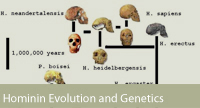




Integrative Human Biology (IHB) is an interdisciplinary initiative and interdepartmental minor based in the Departments of Anthropology and Biology and open to students in all majors. Its purpose is to advance education and research in human form and function, human evolution and biological variation, human behavior, and the roles humans play in local and global ecosystems. The IHB minor should be of particular interest to students who are considering careers in the health professions (medicine, nursing, physical therapy, public health, social work, etc.), environmental science and law, biology, and anthropology. For further information about the program, contact Shawn Carlyle (Anthropology advisor) at 801-581-6251 or Denise Brenes (Biology advisor) at 801-581-6244.
News & Events
The Anthropology Department will be moving to a new home in fall 2018, in the new Carolyn and Kem Gardner Building. While we will miss the character of the old Stewart Building, the new labs will accommodate more students interested in research on modern and ancient DNA, hormone analysis, zooarchaeology, and stable isotope analyses.
Congratulations to Dr. Alan Rogers, whose 1992 paper with Henry Harpending is now a citation classic in Molecular Biology and Evolution. The paper used genetic differences in modern humans to make inferences about the prehistory of populations and the origin of modern humans, and has been cited over 4000 times.
Congratulations to Dr. Brian Codding, who received the University's 2017 Presidential Scholar Award in recognition of his outstanding research on foraging adaptations in both contemporary and prehistoric contexts. Dr. Codding was recently awarded a major NSF grant to examine the effects of environmental variation and firewood harvesting on woodland ecosystems, to determine the conditions that promote healthy forests.
Sustainability is also the theme of new research by Dr. Shane Macfarlan, who is studying human-environmental interactions in Baja California with the support of a National Geographic Society Research and Exploration Grant. The area is known both for its arid land springs and its biological diversity, and the team will explore how the ranchers cope with these extreme conditions and the implications for resource sustainability. There is talk about possibly developing a fieldschool in this area... we'll keep you posted as we learn more!
Taming Humanity's Urge to War
Videos of the conference talks

